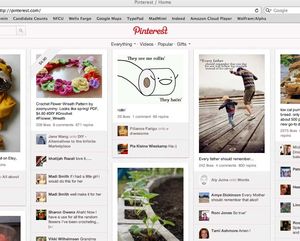So, have you had a chance to check out Pinterest? If you’re like a lot people, maybe you got sucked in and spent more time on the site than you intended!
To finish up the discussion we started last week, I’ll restate the question that I left unanswered:
How can the Pinterest insights be used in your business?
First, I’m not suggesting that your company establish a Pinterest account and start trying to use this  avenue to accomplish various business objectives (marketing, recruiting, band building, etc.). Instead, I’m proposing that we try to learn from their methodologies.
avenue to accomplish various business objectives (marketing, recruiting, band building, etc.). Instead, I’m proposing that we try to learn from their methodologies.
I know that most real estate companies are already participating in various social networking initiatives. Much of the involvement is early stage and there is much to learn as we all try to make these venues produce results. So, what has Pinterest figured out, and how can you apply some of the lessons to your social networking efforts?
Here are some ideas that came to mind as I pondered this question.
1. There is a difference between congregating around interest and congregating around relationship.
 Pinterest teaches us that there can be an appropriate (and sometimes necessary) separation between my interests and my relationships. The personal nature of information that I share with family and friends is not interesting to most people.
Pinterest teaches us that there can be an appropriate (and sometimes necessary) separation between my interests and my relationships. The personal nature of information that I share with family and friends is not interesting to most people.
People seem to open up a little more on-line when they are communicating about their interests. In doing so, there is more diversity in the types of people who can connect around a topic of shared interest.
2. Business more naturally connects with interest.
You’ve probably heard the old saying: People hate to be sold, but love to buy. When there is a common interest that a group of people congregate around, it is natural for people to talk about the products and services they use to support that interest.
However, it’s usually awkward to first have a relationship with someone based on a personal connection (ex. alumni of the same high school), and then have a conversation about a product or service. I’m not saying that this never happens, but it quickly raises on-line privacy concerns for most people; Many people feel that a relational interest is being contrived for a business objective.
3. People are drawn to pictures.
Pinterest didn’t discover this phenomenon, but they’ve certainly mastered its application. There is something magnetic about an interesting picture.
 For example, one of my business partners has a 24-year old daughter who lives in New York City and works for a publishing company. Now, I’m not overly interested in the publishing industry or the daily life of a young female who lives on the other side of the country. But, this young woman takes incredible pictures.
For example, one of my business partners has a 24-year old daughter who lives in New York City and works for a publishing company. Now, I’m not overly interested in the publishing industry or the daily life of a young female who lives on the other side of the country. But, this young woman takes incredible pictures.
She writes a blog about what she calls her wonderful adventure in New York City. My wife and I will occasionally pop on her blog with the purpose of seeing what cool pictures Heather has posted this week. There is something very captivating about a person who has a passion and captures it with pictures.
4. Facebook and Twitter may get you where you want to go.
There is a bunch of discussion among real estate companies in the last year or so about using Facebook and Twitter as avenues for promoting business interests. The thought is that they are the largest and most prominent social networks, so it only makes sense to attempt to leverage their large membership bases.
 Pinterest may be teaching us something different—it is a social networking site that does just one thing really well. For many real estate companies, it may be worth considering this idea as well.
Pinterest may be teaching us something different—it is a social networking site that does just one thing really well. For many real estate companies, it may be worth considering this idea as well.
Can you really successfully compete in the Facebook arena, or would it make more sense to consider some less prominent social networking sites, or even create your own network? For example, the music industry has largely benefited from the second of these options.
Bottom line: There is a lot left to learn when it comes to on-line social networking. When a site like Pinterest scores a huge hit, it’s worth paying attention and trying to figure out what they’ve discovered.
 Editor's Note: This article was written by Ben Hess. Ben is the Founding Partner and Managing Director of Tidemark, Inc. and a regular contributor to WorkPuzzle. Comments or questions are welcome. If you're an email subscriber, reply to this WorkPuzzle email. If you read the blog directly from the web, you can click the "comments" link below.
Editor's Note: This article was written by Ben Hess. Ben is the Founding Partner and Managing Director of Tidemark, Inc. and a regular contributor to WorkPuzzle. Comments or questions are welcome. If you're an email subscriber, reply to this WorkPuzzle email. If you read the blog directly from the web, you can click the "comments" link below.













